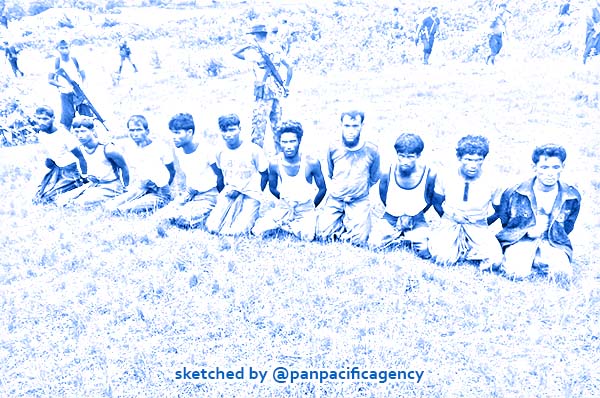[Analytics] Disinformation and xenophobia target Malaysia’s Rohingya

Ten Rohingya men with their hands bound kneel as members of the Myanmar security forces stand guard in Inn Din village of Rakhine State, Myanmar, September 2, 2017. Picture taken September 2, 2017. Handout via Reuters. Sketched by the Pan Pacific Agency.
The Rohingya in Malaysia have become the target of increasing xenophobia and hate speech. Disinformation — the intentional creation of false information — is fuelling the fire of outrage against this marginalised community. Harris Zainul specially for the East Asia Forum.
False allegations began circulating on social media in April 2020. They included claims that a Rohingya man was insisting on full citizenship rights for Rohingya refugees, that the Rohingya are clashing with the police, and that they are receiving monetary allowance from the UN High Commissioner for Refugees (UNHCR). Other false narratives allege that the Rohingya are enjoying special privileges, flouting the law without consequences and obtaining healthcare benefits at the expense of ordinary Malaysians.
Adding to the already-polluted information environment was one news outlet’s claim that foreigners were throwing urine at members of the Malaysian Armed Forces. The report has since been corrected by the outlet but without indication of what was amended. Despite the report not singling out migrants of any nationality, it contributed to the general ill-feelings towards migrant workers, including the Rohingya.
Not helping matters were statements by leaders that normalise and perpetuate stereotypes of ‘illegal immigrants’ — referring to migrant workers without permits, refugees and asylum seekers — as disease carriers that place ordinary Malaysians at risk. This has unfortunately granted some semblance of legitimacy to baseless stereotypes.
While there were ordinary social media users creating and spreading hate speech and disinformation, there is also evidence of inauthentic social media accounts using a false identity. This is in addition blog articles with no by-lines disseminating hate, as well as the figurative black box of encrypted messaging applications. This suggests that certain parties are intentionally creating a hostile environment surrounding Rohingya-related issues.
Without recognition in their home country, the Rohingya are a convenient target, vulnerable to xenophobia, hate speech and disinformation. This means that diplomatic support and international pressure is unlikely to be unforthcoming. So the Rohingya have to rely on civil society, non-governmental organisations or themselves to challenge these problematic narratives.
The disinformation can mislead public opinion on the Rohingya issue, creating an urgent need to counter its spread. Malaysians are becoming increasingly desensitised to the government’s inhumane actions against the Rohingya and other refugees, asylum seekers and migrant workers. This includes the turning away of 200 Rohingya on a boat in April 2020 and the detention of migrants and refugees that started during the COVID-19 lockdown in May.
While the Malaysian government has acknowledged the problem of false information and hate speech directed at the Rohingya, its counter-strategy leaves much to be desired.
First, its approach to not hesitate to take all action against misinformation based on broadly applicable laws — such as the Communications and Multimedia Act 1998, the Penal Code and the Sedition Act 1948 — is ineffective owing to the vagueness of the legislation. This reduces the normative value of government signalling to the public that creating and sharing false information and hate speech is unacceptable and fails to deter would-be creators.
Second, while credit must be given to the government’s fact-checking outfit Sebenarnya.my for its approximately 400 debunks on COVID-19-related false information (as of June 2020), its coverage of disinformation related to the Rohingya falls short — with a mere six fact-checks in 2020.
Third, absent from policy conversations about dealing with disinformation are plans to hold social media companies accountable for problematic content and inauthentic accounts on their platforms. The Rohingya in Myanmar have previously been victims of violence stemming from hate speech on Facebook. This could serve as a cautionary tale for Malaysia’s Rohingya population if social media companies are left unchecked.
Fourth, any approach solely relying on legislation and policies will not address the root causes of the problem. The attitude of Malaysians towards the Rohingya cannot be simplistically reduced to the consequences of disinformation or a lack of fact-checking. The xenophobic sentiment was already present within segments of Malaysian society. With the COVID-19 pandemic further threatening already shrinking rice bowls, disinformation merely provided an outlet for latent ill-feelings to blame the distinct ‘other’.
Without meaningful engagement between the Rohingya and the wider Malaysian community to dispel stereotypes, the fertile ground that allowed disinformation to spread so easily will not be comprehensively addressed.
The outrage against the Rohingya in Malaysia somewhat subsided last month. But the period between mid-March to late-June 2020 has highlighted that social tensions in Malaysia are closer to the surface than comfortable and that segments of the Malaysian population are highly susceptible to false information targeting a vulnerable minority group.
Since the situation in Rakhine and Cox’s Bazar does not seem likely to improve, Malaysia will continue to be a destination for Rohingya asylum seekers. Moving forward, it is imperative to address the question of how resilient Malaysia’s plural society is when faced with such widespread disinformation.
Harris Zainul is an analyst at the Institute of Strategic and International Studies (ISIS) Malaysia.